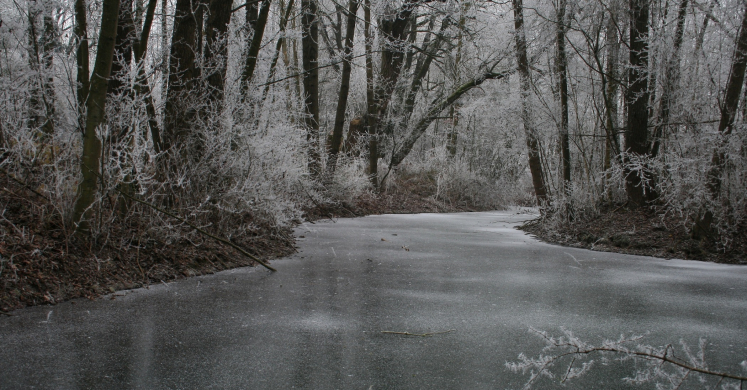Phipps Stories

#bioPGH: Not a Fish Out of Water - A Fish in the Winter!
 A resource of Biophilia: Pittsburgh, #bioPGH is a weekly blog and social media series that aims to encourage both children and adults to reconnect with nature and enjoy what each of our distinctive seasons has to offer.
A resource of Biophilia: Pittsburgh, #bioPGH is a weekly blog and social media series that aims to encourage both children and adults to reconnect with nature and enjoy what each of our distinctive seasons has to offer.
Have you ever wondered how fish manage in the winter time? The idea of freezing cold water, sometimes covered in ice, may sound daunting to us, but it’s just another winter to fish. Let’s explore!
The short answer is that fish are adapted to spend the winter in cold water. Sometimes, fish take advantage of microhabitats (literally “small habitat”), perhaps a small area where the water is slightly warmer because of a different depth; and some fishes will burrow into mud. Most, though, will simply stay closer to the bottom of their body of water than they would in the warmer months. Of course, our Pennsylvania waters won’t get cold enough to warrant a chemical “anti-freeze” like some polar fish species produce, but I would imagine that even water just above freezing could be…let’s say quite chilly. How do they manage an intense season of low temperatures and reduced resource availability?
Until recently, it was thought that a major key to fishes’ winter survival was a change in metabolism. Metabolism refers to how a body processes the resources it needs for regular function — for example, how we process food into usable energy. We are quite familiar with the way mammals and birds manage hibernation and torpor metabolically: they slow down. Their heart rate slows and they become less active, which reduces their energetic demands and allows them to use less oxygen and consume less food than in warmer weather. It has long been assumed that a lowered metabolism was an important part of fishes’ winter strategies. However, recent work has suggested that fish rely more on reduced physical activity than they do on actually lowering their metabolic rate. When fish do need a quick meal or snack, there is still food available in the form of aquatic insects and other invertebrates (if you remember, we explored winter time aquatic invertebrates a few years ago here on the blog.)
And of course, since we’ve been noting that fish and some of their aquatic neighbors live under the ice in the winter, we should take a moment to note a particular density quirk of ice. Most compounds are more dense as a solid than they are as a liquid, but this is not true for water. Water is at its highest density at approximately 4 degrees Celsius (39 degrees Fahrenheit.) This means that ice, being less dense than cold water, will float above that cold water. The quirky property of hydrogen bonds makes this difference in water, and it’s a good thing too! If ice froze at the bottom of ponds and lakes, following the trend of most other solid compounds, the fish and other creatures in the body of water wouldn’t stand a chance against freezing in winter. Since ice freezes on the top, though, aquatic residents are able to live safely under the ice in water that is at least a few degrees above freezing.
Well, even if fish are well adapted to living in cold water, I think I will stay in my house with my cozy blankets, thank you. But I can heartily appreciate fish’s winter survival strategies and wonder at yet another marvel of nature!
Connecting to the Outdoors Tip: This is one topic where I wouldn't necessarily recommend going out and checking on the subject (ice safety first), but if you're interested in learning more about the fishes of PA, check out the Fish and Boat Commission's resource page!
Continue the Conversation: Share your nature discoveries with our community by posting to Twitter and Instagram with hashtag #bioPGH, and R.S.V.P. to attend our next Biophilia: Pittsburgh meeting.
Resources
NOAA – Where do fish go when it freezes outside?
Harvard Health Publishing -- Does Metabolism Matter in Weight Loss? à What Is Metabolism?
Images: Cover, Pixabay user JW; header, Pixabay user dagmarbendel; both public domain

